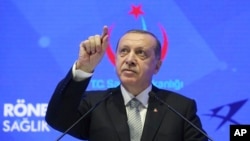Turkish President Recep Tayyip Erdogan starts a two-day tour of Gulf states Sunday in an effort to resolve a crisis involving Qatar, and four Arab states accusing the small peninsular nation of supporting terrorism.
Saudi Arabia, Egypt, the United Arab Emirates and Bahrain have severed relations with Qatar. They are enforcing a land and sea embargo, accusing the oil-rich nation of supporting extremist groups and destabilizing the region, allegations Qatar has denied.
“Turkey is trying to contribute to efforts to facilitate toward peace and stability,” said Mithat Rende, a retired Turkish ambassador to Qatar. "Erdogan will try to bring people together if possible or communicate messages from one side to another."
Erdogan starts his trip in the Saudi port city of Jeddah, where he will meet with King Salman bin Abdulaziz and Crown Prince Mohammed bin Salman. The Turkish president will then travel to Kuwait for meetings with Emir Sheikh Sabah al-Ahmad al-Sabah, before heading to Qatar to see Emir Sheikh Tamim bin Hamad Al-Thani.
Some observers have voiced skepticism about Erdogan’s tour. Atilla Yesilada, a political consultant with Global Partners expressed doubt that Turkey can achieve anything, given its negotiating skills.
“Turkey does not pull any weight in the Arab world," he said. "[Ahmet] Davutoglu [the former Turkish prime minister] might have made a difference, or [Abdullah] Gul, [former Turkish president], but Erdogan won’t.”
Analysts say any effort by Erdogan to position himself as a facilitator will likely be handicapped by Ankara’s strong backing of Doha in the diplomatic crisis. Turkey has been in the forefront of breaking the blockade of Qatar, airlifting large amounts of food and even sending milk cows.
In the middle of the crisis, Ankara opened a military base in Qatar as part of an agreement dating back to 2014. Turkish deployments of equipment, like tanks, to the base, have been steadily rising. The Saudi-led group had come up with a list of 13 demands on Qatar, including closing the Turkish base; but that demand was withdrawn, a move for which Ankara took credit.
“Turkey has always made constructive calls to parties. These have already yielded consequences,” said Turkish presidential spokesman Ibrahim Kalin, speaking at press conference Wednesday. “Reducing the number of demands from 13 to six and the removal of a demand to shut the Turkish base are positive developments.”
Ankara argues its military base in Qatar should not be viewed as being partisan. “We are also contributing to United Arab Emirates," said Rende. "Turkey has been training F-16 [fighter jet] pilots from the UAE and also ... other military planes. All these took place in Turkey so we are interested in maintaining good relations with all."
Under Erdogan’s rule, Turkish foreign policy has been re-balanced with more of a focus on the Gulf region. Ankara has been courting Arab investment and is seeking to project its influence. But, some analysts are warning Turkey could be the ultimate loser in the crisis over Qatar.
“If Qatar wins and maintains its policy course that's so widely criticized by the rest of the Arabs, Saudi Arabia, Egypt, UAE will never trust Turkey," warned Yesilada. "Any hopes of building a military alliance over Syria or against Iran or substantial foreign investments from those countries is an illusion."
Alternatively, he added, "in the more likely scenario, if the Qataris lose, one of the conditions will be the sheikhdom should not invest in Turkey in a large magnitude. Whoever wins, Turkey has lost. Given Turkey's history of colonialism in Arab countries, it wasn't smart to get involved in these countries in the first place."
The Turkish Ottoman empire once stretched across the Arab world. Erdogan maintains there is little historical resentment over past colonial rule, arguing Turkey shares a common Muslim identity. But Rende said Erdogan’s two-day trip could be as much about protecting Turkish interests as resolving the ongoing regional crisis.
"The Turkish president, while visiting the region, will probably tell the interlocutors that this [crisis] is not in the interest of anyone,” said the former ambassador. “... Turkey as a country is interested in maintaining good relations not only with Qatar but with all parties."




